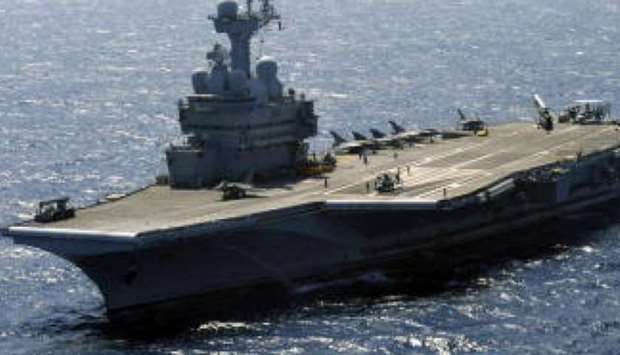EU foreign ministers agreed Monday to a naval operation to enforce an arms embargo on war-torn Libya, overcoming objections from countries who feared it may encourage new migrant flows.
The new mission will include ships as well as air capacity and the possibility of ground forces, Italy's Foreign Minister Luigi Di Maio said.
It will focus on the eastern Mediterranean, through which weapons pass on their way to Libya.
The conflict in the oil-rich but turbulent North African state was on the agenda for EU ministers meeting in Brussels but EU diplomatic chief Josep Borrell had played down hopes of an agreement over objections from Austria and Hungary.
‘We all agreed to create a mission to block the entry of arms into Libya, with rules of engagement,’ di Maio said.
‘If it creates a 'pull factor', that is to say the ships attract migrants, the mission will be stopped.’
Austria had led opposition to reviving Operation Sophia -- set up in 2015 to fight people smuggling across the Mediterranean -- to enforce the embargo with ships, fearing it could reactivate a rescue fleet that would end up ferrying migrants across the Mediterranean to Europe.
Hungary, whose right-wing populist government has taken a tough anti-immigration stance, is understood to have supported Austria's objections.
Making the arms embargo work is seen as crucial to stabilising the Libyan conflict, where the UN-backed Tripoli government is under attack from the forces of military strongman Khalifa Haftar, who controls much of the country's south and east.
Di Maio and his Austrian counterpart Alexander Schallenberg insisted Operation Sophia was finished and the new mission was a different beast.
‘There is a basic consensus that we now want a military operation and not a humanitarian mission,’ Schallenberg said.
German Foreign Minister Heiko Maas said there had been a long discussion about whether a naval element was needed but finally it was agreed it was ‘necessary to get a complete picture’.
‘But it will be only in the eastern Mediterranean, where the weapons routes run,’ Maas said.
- Libyan chaos -
A senior UN official warned Sunday that a fragile truce agreed in January but regularly breached is ‘holding by a thread’.
World leaders agreed at a Berlin summit last month to end all meddling in the conflict and stop the flow of weapons into Libya, but little has changed on the ground since then.
After a meeting of foreign ministers in Munich on Sunday -- a follow-up to the Berlin conference -- Borrell hit out at Austria for blocking the Operation Sophia revival, saying it was absurd for a landlocked country which does not even have a navy to take such a stance.
On Monday, Borrell renewed his attack, rejecting Vienna's claim that reviving naval operations would create a ‘pull effect’ encouraging migrants to try to cross the Mediterranean by offering the prospect of rescue if they got into difficulties at sea.
Former Spanish foreign minister Borrell has said the renewed mission would focus on known weapons smuggling routes, away from the areas that human traffickers use to bring migrants from Libya.

